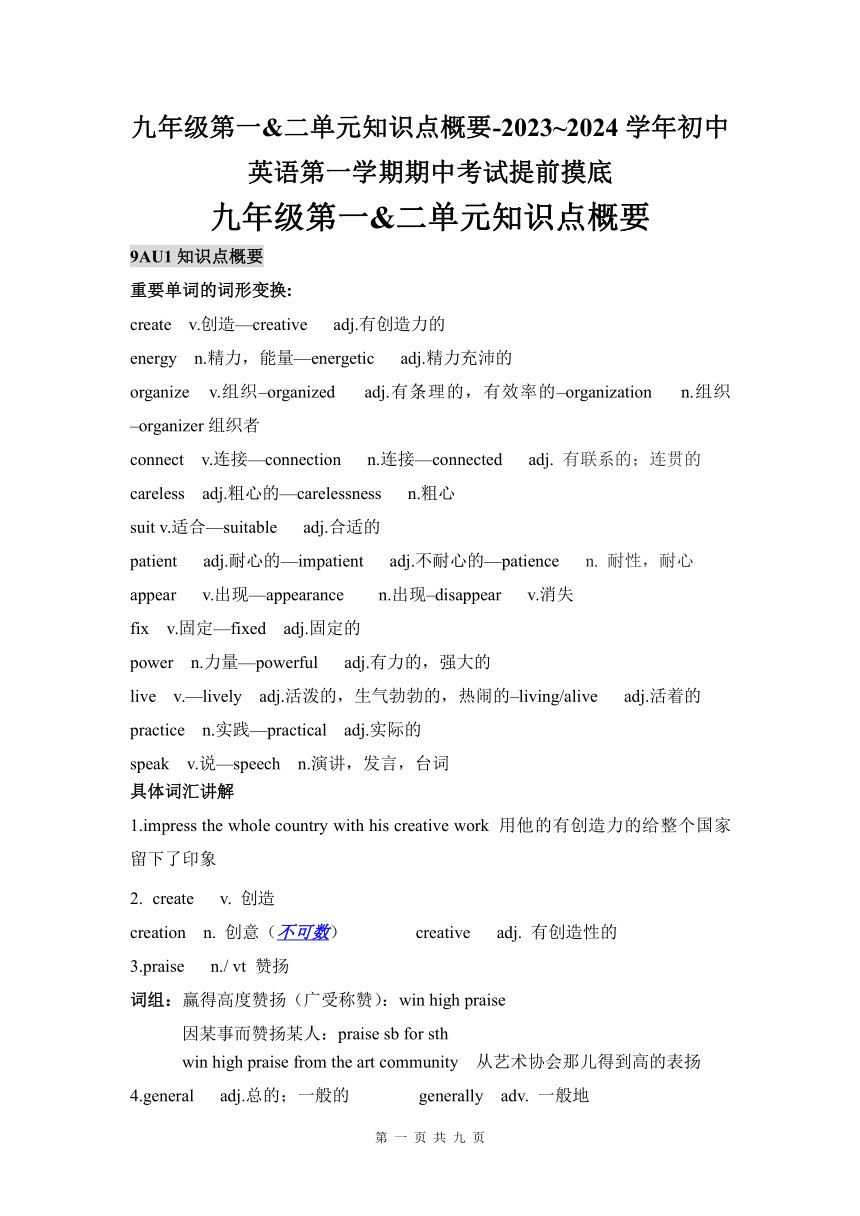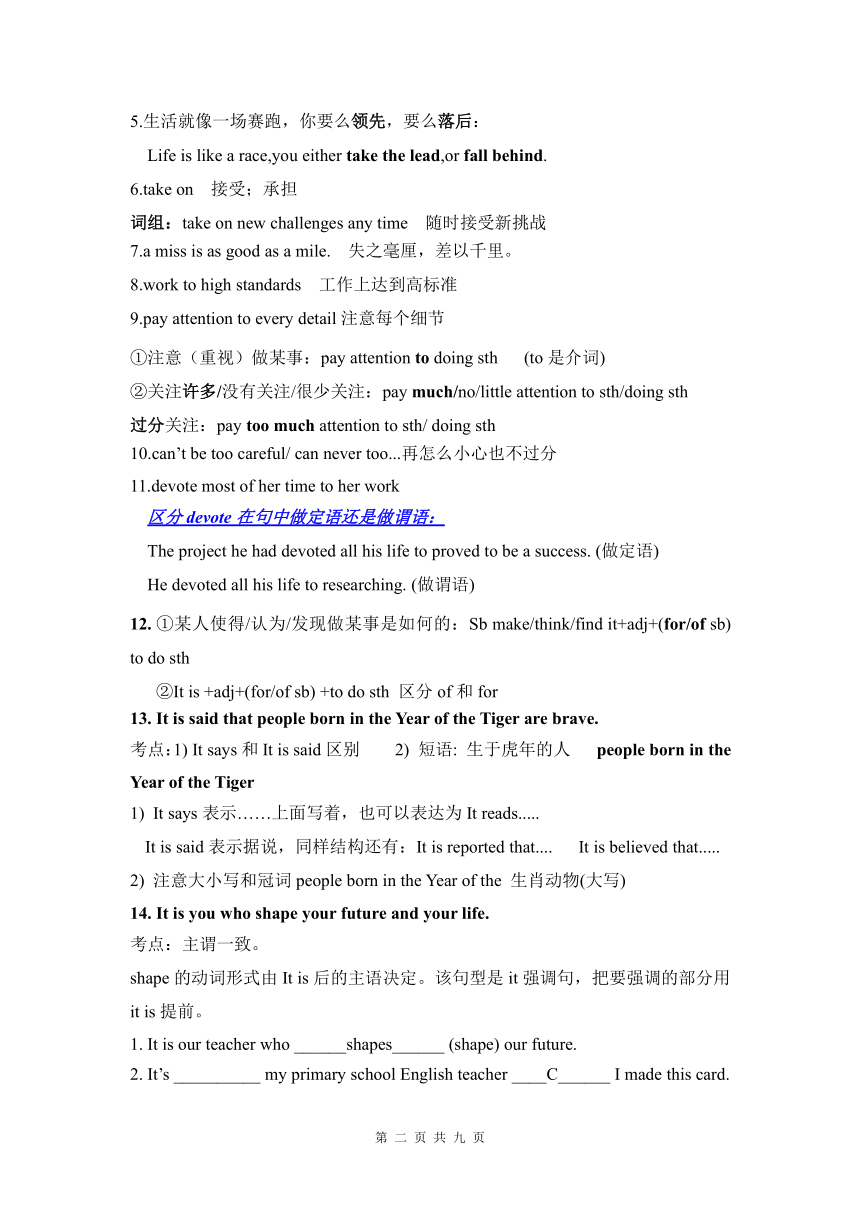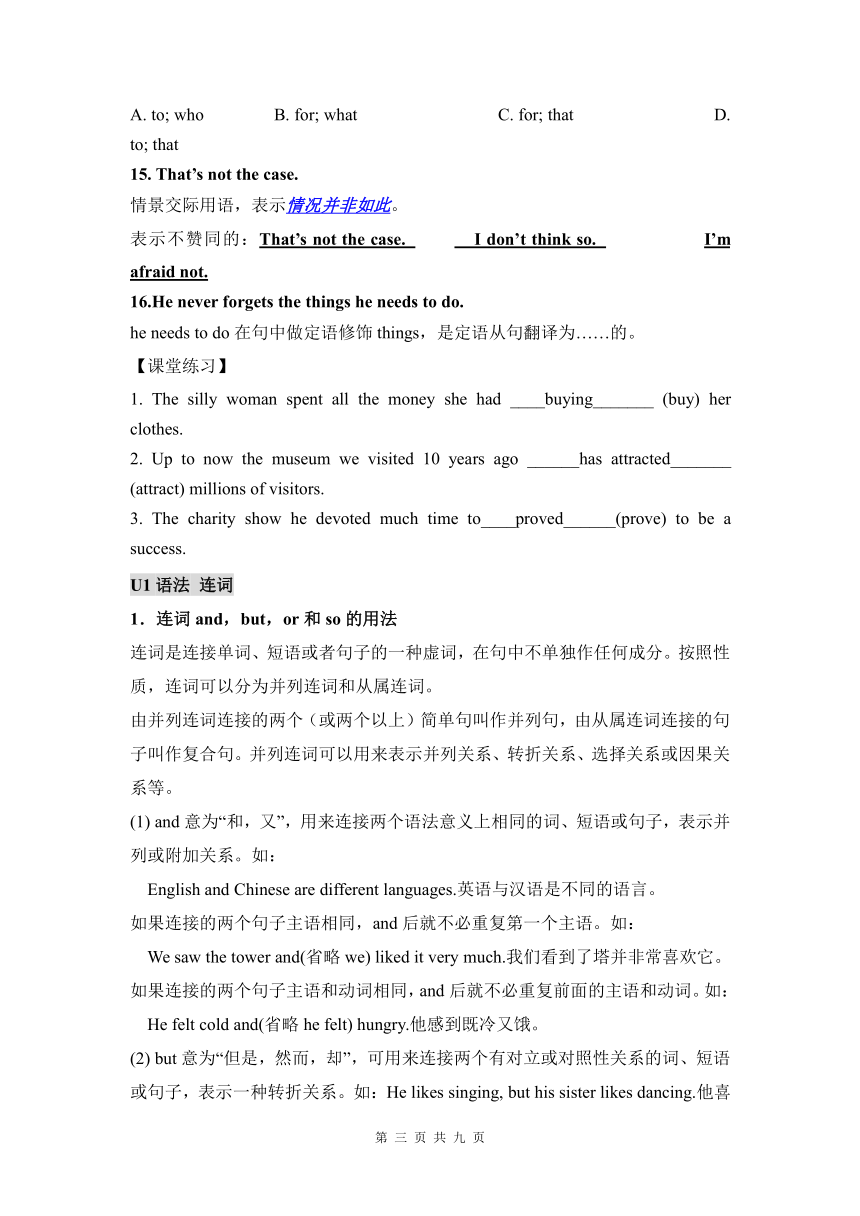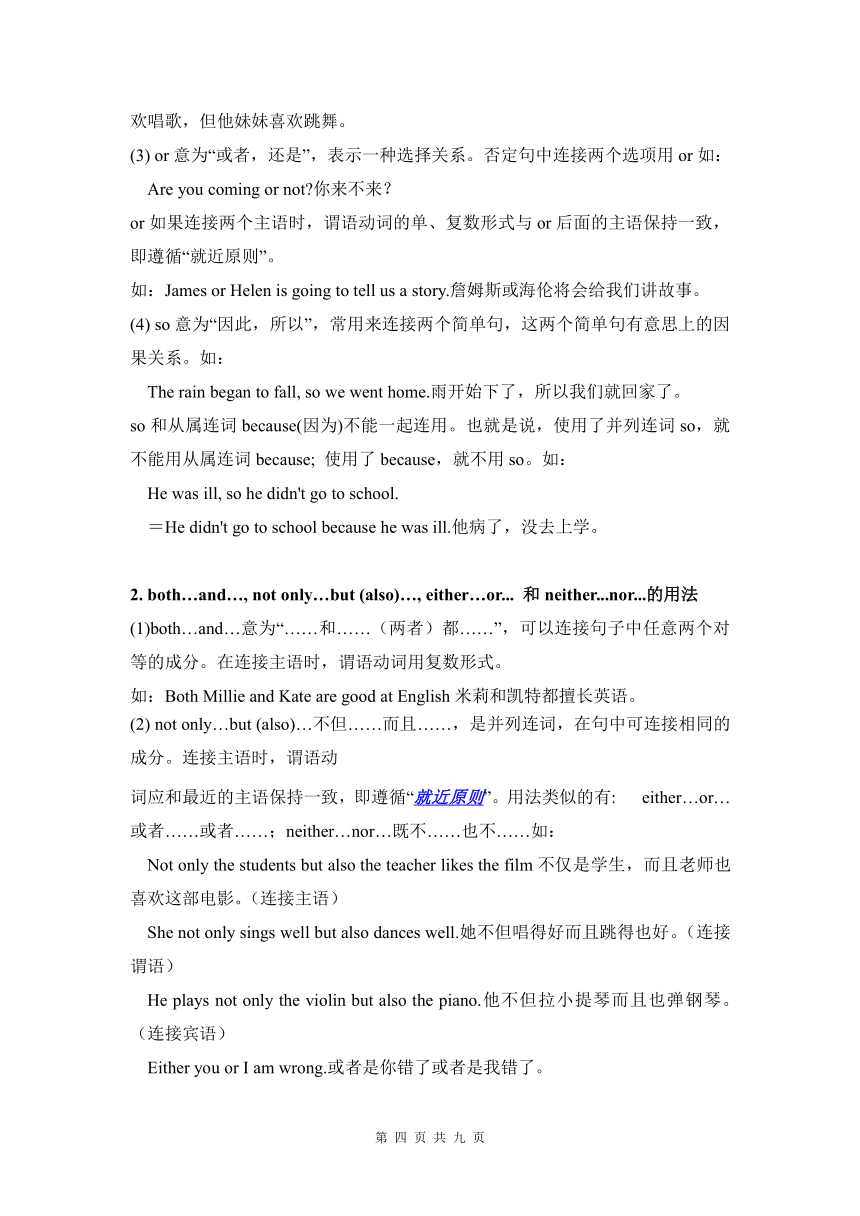2023-2024学年牛津译林版九年级期中第一&二单元知识点归纳学案
文档属性
| 名称 | 2023-2024学年牛津译林版九年级期中第一&二单元知识点归纳学案 |  | |
| 格式 | docx | ||
| 文件大小 | 27.5KB | ||
| 资源类型 | 教案 | ||
| 版本资源 | 牛津译林版 | ||
| 科目 | 英语 | ||
| 更新时间 | 2023-11-15 21:50:59 | ||
图片预览




文档简介
九年级第一&二单元知识点概要-2023~2024学年初中英语第一学期期中考试提前摸底
九年级第一&二单元知识点概要
9AU1知识点概要
重要单词的词形变换:
create v.创造—creative adj.有创造力的
energy n.精力,能量—energetic adj.精力充沛的
organize v.组织–organized adj.有条理的,有效率的–organization n.组织–organizer组织者
connect v.连接—connection n.连接—connected adj. 有联系的;连贯的
careless adj.粗心的—carelessness n.粗心
suit v.适合—suitable adj.合适的
patient adj.耐心的—impatient adj.不耐心的—patience n. 耐性,耐心
appear v.出现—appearance n.出现–disappear v.消失
fix v.固定—fixed adj.固定的
power n.力量—powerful adj.有力的,强大的
live v.—lively adj.活泼的,生气勃勃的,热闹的–living/alive adj.活着的
practice n.实践—practical adj.实际的
speak v.说—speech n.演讲,发言,台词
具体词汇讲解
1.impress the whole country with his creative work 用他的有创造力的给整个国家留下了印象
create v. 创造
creation n. 创意(不可数) creative adj. 有创造性的
3.praise n./ vt 赞扬
词组:赢得高度赞扬(广受称赞):win high praise
因某事而赞扬某人:praise sb for sth
win high praise from the art community 从艺术协会那儿得到高的表扬
4.general adj.总的;一般的 generally adv. 一般地
5.生活就像一场赛跑,你要么领先,要么落后:
Life is like a race,you either take the lead,or fall behind.
6.take on 接受;承担
词组:take on new challenges any time 随时接受新挑战
7.a miss is as good as a mile. 失之毫厘,差以千里。
8.work to high standards 工作上达到高标准
9.pay attention to every detail注意每个细节
①注意(重视)做某事:pay attention to doing sth (to是介词)
②关注许多/没有关注/很少关注:pay much/no/little attention to sth/doing sth
过分关注:pay too much attention to sth/ doing sth
10.can’t be too careful/ can never too...再怎么小心也不过分
11.devote most of her time to her work
区分devote在句中做定语还是做谓语:
The project he had devoted all his life to proved to be a success. (做定语)
He devoted all his life to researching. (做谓语)
12. ①某人使得/认为/发现做某事是如何的:Sb make/think/find it+adj+(for/of sb) to do sth
②It is +adj+(for/of sb) +to do sth 区分of和for
13. It is said that people born in the Year of the Tiger are brave.
考点:1) It says和It is said区别 2) 短语: 生于虎年的人 people born in the Year of the Tiger
It says表示……上面写着,也可以表达为It reads.....
It is said表示据说,同样结构还有:It is reported that.... It is believed that.....
注意大小写和冠词people born in the Year of the 生肖动物(大写)
14. It is you who shape your future and your life.
考点:主谓一致。
shape的动词形式由It is后的主语决定。该句型是it强调句,把要强调的部分用it is提前。
1. It is our teacher who ______shapes______ (shape) our future.
2. It’s __________ my primary school English teacher ____C______ I made this card.
A. to; who B. for; what C. for; that D. to; that
15. That’s not the case.
情景交际用语,表示情况并非如此。
表示不赞同的:That’s not the case. I don’t think so. I’m afraid not.
16.He never forgets the things he needs to do.
he needs to do在句中做定语修饰things,是定语从句翻译为……的。
【课堂练习】
1. The silly woman spent all the money she had ____buying_______ (buy) her clothes.
2. Up to now the museum we visited 10 years ago ______has attracted_______ (attract) millions of visitors.
3. The charity show he devoted much time to____proved______(prove) to be a success.
U1语法 连词
1.连词and,but,or和so的用法
连词是连接单词、短语或者句子的一种虚词,在句中不单独作任何成分。按照性质,连词可以分为并列连词和从属连词。
由并列连词连接的两个(或两个以上)简单句叫作并列句,由从属连词连接的句子叫作复合句。并列连词可以用来表示并列关系、转折关系、选择关系或因果关系等。
(1) and意为“和,又”,用来连接两个语法意义上相同的词、短语或句子,表示并列或附加关系。如:
English and Chinese are different languages.英语与汉语是不同的语言。
如果连接的两个句子主语相同,and后就不必重复第一个主语。如:
We saw the tower and(省略we) liked it very much.我们看到了塔并非常喜欢它。
如果连接的两个句子主语和动词相同,and后就不必重复前面的主语和动词。如:
He felt cold and(省略he felt) hungry.他感到既冷又饿。
(2) but意为“但是,然而,却”,可用来连接两个有对立或对照性关系的词、短语或句子,表示一种转折关系。如:He likes singing, but his sister likes dancing.他喜欢唱歌,但他妹妹喜欢跳舞。
(3) or意为“或者,还是”,表示一种选择关系。否定句中连接两个选项用or如:
Are you coming or not 你来不来?
or如果连接两个主语时,谓语动词的单、复数形式与or后面的主语保持一致,即遵循“就近原则”。
如:James or Helen is going to tell us a story.詹姆斯或海伦将会给我们讲故事。
(4) so意为“因此,所以”,常用来连接两个简单句,这两个简单句有意思上的因果关系。如:
The rain began to fall, so we went home.雨开始下了,所以我们就回家了。
so和从属连词because(因为)不能一起连用。也就是说,使用了并列连词so,就不能用从属连词because; 使用了because,就不用so。如:
He was ill, so he didn't go to school.
=He didn't go to school because he was ill.他病了,没去上学。
2. both…and…, not only…but (also)…, either…or... 和neither...nor...的用法
(1)both…and…意为“……和……(两者)都……”,可以连接句子中任意两个对等的成分。在连接主语时,谓语动词用复数形式。
如:Both Millie and Kate are good at English米莉和凯特都擅长英语。
(2) not only…but (also)…不但……而且……,是并列连词,在句中可连接相同的成分。连接主语时,谓语动
词应和最近的主语保持一致,即遵循“就近原则”。用法类似的有: either…or…或者……或者……;neither…nor…既不……也不……如:
Not only the students but also the teacher likes the film不仅是学生,而且老师也喜欢这部电影。(连接主语)
She not only sings well but also dances well.她不但唱得好而且跳得也好。(连接谓语)
He plays not only the violin but also the piano.他不但拉小提琴而且也弹钢琴。(连接宾语)
Either you or I am wrong.或者是你错了或者是我错了。
Neither you nor I am wrong.你和我都没有错。
9AU2知识点概要
重要单词的词形变换:
relax v.放松 –relaxed adj.感到放松的–relaxing adj.令人放松的
peace n.和平,平静—peaceful adj.和平的
sad adj.悲伤的-sadly adv.悲伤地-sadness n.悲伤–sadder—more sadly
wed v.嫁娶—wedding n.婚礼
prefer v.宁愿—preferred (过去式)
feel v.感到—feeling n.感觉,感受
wise adj.聪明的—wisely adv.聪明地—wisdom n.智慧
strong adj.强壮的—stronger –strength n.力量
difficult adj.困难的—difficulty n.困难
decide v.决定—decision n.决定
certain adj.当然的,一定的—certainly adv.当然
person n.人—personal adj.个人的,私人的—personality n.个性
celebrate v.庆祝—celebration n.庆祝活动
stress n.压力—stressed adj.有压力的,紧张的
suggest v.建议—suggestion n.建议
warm adj.温暖的—warmth n.温暖,暖和
hot adj. 热的;辣的—heat n.热量
具体词汇讲解
1.influence our moods 影响我们的情绪
2.make us feel happy or sad,energetic or sleepy让我们感觉快乐、悲伤、活力、昏昏欲睡
3.feel v.感觉 feeling n. 感觉(可数名词)
4.sad adj. 伤心的; sadness n.伤心 注意比较级:sadder
5.①calm down 冷静下来 ② keep calm保持冷静 ③calm oneself down 使某人镇定下来
6.bring peace to our mind and body给我们的身心带来宁静
7.cheer you up让你振作
8.remind you of a warm sunny day
①remind sb. of sth. 使某人想起某物
②remind sb. to do sth.提醒某人做某事
9.hope for success渴望成功
10.represent new life 代表新的生命
11.green with envy妒忌
12.be of some help有一些帮助
词组:be of (much/little/no)help to sb =be helpful to sb
13.make it easier to take action使得采取措施更容易
14.have difficulty making a decision 做决定有困难
(1)have difficulty/problems/trouble with sth./(in)doing sth. 做某事有困难
(2)have no difficulty doing sth 毫不费劲做某事
15.①prefer-preferred更喜欢 过去式注意双写
②prefer sth./to do sth. 更喜欢某物/做某事
③prefer A to B 相比较B更喜欢A
【注意】prefer sth with sth 宁愿选择加了.....的某物
eg:—Which do you prefer,tea of coffee
—I would prefer coffee with milk. 加了牛奶的咖啡
④prefer doing A to doing B相比较做A更喜欢做B
=prefer to do A rather than do B
⑤would rather (not) do sth. 宁愿(不)做某事
would rather do A than do B 宁愿做A 而不愿做B
16.require
(1)要求=ask
用法:require sb. to do sth.
(2)需要=need
用法:require doing=require to be done某事需要被做(主动表示被动)
require strength in one’s mind and body 身心需要力量
U2语法 宾语从句
一、概念:
宾语从句是一种名词性从句,在句中作及物动词的宾语,或介词的宾语,或形容词的宾语。
1.We know Mr Green teaches English. (动词宾语)
2. Miss Zhang is angry at what you said. (介词宾语)
二、宾语从句三要素:
宾语从句之连接词:that/ if/whether
that引导的宾语从句:
(一)省略性
1.可以省略
连词that引导宾语从句,只起连接主、从句的作用,它本身无意义,在口语或非正式文体中常省略。如:
He says( that) he is a Young Pioneer.
他说他是个少先队员。
2.不可以省略
从句的主语是that时,that不省略。如:
We know that that is an interesting story. 我们知道那是一个有趣的故事。
(二)何时使用
1.主句的谓语动词是think,hear,hope,wish,remember,forget,know,say,guess等时,常接that引导的宾语从句。如:I hope( that) he will be fine soon.我希望他很快好起来。
2.主句由“连系动词+形容词”构成的“系表”结构,常接that引导的宾语从句。这类形容词多表示感情,如happy,glad,pleased,sad,sure,afraid等等。
如: I'm afraid( that) he can't come.恐怕他不能来了。
if/whether引导的宾语从句:
在下列情况下只能用whether,不能用if:
(1)在动词不定式之前只能用whether。
I can't decide whether to stay. 我不能决定是否留下。
(2)在whether… or not的固定搭配中。如:
1 want to know whether it's good news or not. 我想知道是否是好消息。
(3)在介词后,只能用whether。如:
His father is worried about whether he loses his work. 他的父亲担心是否会失去工作。
(4)宾语从句放在句首表示强调时,只能用whether。如:
Whether they can finish the work on time is still a problem.他们是否能准时完成这项工作还是个问题。
(5)用if会引起歧义时,只用whether。
如:Could you tell me if you know the answer
这句话有两种意思:“你能告诉我是否知道答案吗?”或“如果你知道答案,请告诉我,好吗?”。如用whether可避免歧义。
如果宾语从句原来是特殊疑问句,只需用原来的特殊疑问词引导。
疑问词: who/ whom/ whose/ which/what/when/where/why/how...引导的宾语从句
The small children don't know what is in their stockings.
这些小孩子不知道袜子里有什么东西?
He asked whose handwriting was the best in our class.
他问我们班上谁的书法最好。
宾语从句之语序
正常语序常考的例子:
what's the matter
What's wrong
What happened to you
Who teaches you English
宾语从句的特殊语序
主句是Do you think/believe/suppose作为插入语时,宾语从句是由特殊疑问词引导的,要用:
特殊疑问词+do you think/believe/suppose+陈述语序
eg: What do you think Sally will be in 10 years
【例】1.I think (that) you will like this school soon.
2. Can you tell me how I can get to zoo
She asked me if I knew whose pen it was.
宾语从句之时态
含宾语从句的复合句,主、从句谓语动词的时态呼应包括以下三点内容:
1).如果主句的谓语动词是一般现在时,从句的谓语动词可根据需要,选用相应的任何时态。
【例】1.I don't know when he will come back.
2.He tells me that his sister came back yesterday.
2). 如果主句的谓语动词是过去时,宾语从句的谓语动词只可根据需要,选用过去时态即一般过去时、过去进行时、过去将来时或过去完成时的某一种形式。
【例】1.She says that she is a student. (ⅹ)
She said that she was a student. (√)
2. She says that she will fly to Japan in a week. (ⅹ)
She said that she would fly to Japan in a week. (√)
3. She says that she has finished her homework already. (ⅹ)
She said that she had finished her homework already. (√)
3).如果宾语从句所表示的是客观事实、普遍真理、自然现象或习惯性动作等,不管主句用什么时态,从句时态都用一般现在时。
【例】1.The teacher said that the earth goes round the sun.
2. He told me that Japan is an island country.
九年级第一&二单元知识点概要
9AU1知识点概要
重要单词的词形变换:
create v.创造—creative adj.有创造力的
energy n.精力,能量—energetic adj.精力充沛的
organize v.组织–organized adj.有条理的,有效率的–organization n.组织–organizer组织者
connect v.连接—connection n.连接—connected adj. 有联系的;连贯的
careless adj.粗心的—carelessness n.粗心
suit v.适合—suitable adj.合适的
patient adj.耐心的—impatient adj.不耐心的—patience n. 耐性,耐心
appear v.出现—appearance n.出现–disappear v.消失
fix v.固定—fixed adj.固定的
power n.力量—powerful adj.有力的,强大的
live v.—lively adj.活泼的,生气勃勃的,热闹的–living/alive adj.活着的
practice n.实践—practical adj.实际的
speak v.说—speech n.演讲,发言,台词
具体词汇讲解
1.impress the whole country with his creative work 用他的有创造力的给整个国家留下了印象
create v. 创造
creation n. 创意(不可数) creative adj. 有创造性的
3.praise n./ vt 赞扬
词组:赢得高度赞扬(广受称赞):win high praise
因某事而赞扬某人:praise sb for sth
win high praise from the art community 从艺术协会那儿得到高的表扬
4.general adj.总的;一般的 generally adv. 一般地
5.生活就像一场赛跑,你要么领先,要么落后:
Life is like a race,you either take the lead,or fall behind.
6.take on 接受;承担
词组:take on new challenges any time 随时接受新挑战
7.a miss is as good as a mile. 失之毫厘,差以千里。
8.work to high standards 工作上达到高标准
9.pay attention to every detail注意每个细节
①注意(重视)做某事:pay attention to doing sth (to是介词)
②关注许多/没有关注/很少关注:pay much/no/little attention to sth/doing sth
过分关注:pay too much attention to sth/ doing sth
10.can’t be too careful/ can never too...再怎么小心也不过分
11.devote most of her time to her work
区分devote在句中做定语还是做谓语:
The project he had devoted all his life to proved to be a success. (做定语)
He devoted all his life to researching. (做谓语)
12. ①某人使得/认为/发现做某事是如何的:Sb make/think/find it+adj+(for/of sb) to do sth
②It is +adj+(for/of sb) +to do sth 区分of和for
13. It is said that people born in the Year of the Tiger are brave.
考点:1) It says和It is said区别 2) 短语: 生于虎年的人 people born in the Year of the Tiger
It says表示……上面写着,也可以表达为It reads.....
It is said表示据说,同样结构还有:It is reported that.... It is believed that.....
注意大小写和冠词people born in the Year of the 生肖动物(大写)
14. It is you who shape your future and your life.
考点:主谓一致。
shape的动词形式由It is后的主语决定。该句型是it强调句,把要强调的部分用it is提前。
1. It is our teacher who ______shapes______ (shape) our future.
2. It’s __________ my primary school English teacher ____C______ I made this card.
A. to; who B. for; what C. for; that D. to; that
15. That’s not the case.
情景交际用语,表示情况并非如此。
表示不赞同的:That’s not the case. I don’t think so. I’m afraid not.
16.He never forgets the things he needs to do.
he needs to do在句中做定语修饰things,是定语从句翻译为……的。
【课堂练习】
1. The silly woman spent all the money she had ____buying_______ (buy) her clothes.
2. Up to now the museum we visited 10 years ago ______has attracted_______ (attract) millions of visitors.
3. The charity show he devoted much time to____proved______(prove) to be a success.
U1语法 连词
1.连词and,but,or和so的用法
连词是连接单词、短语或者句子的一种虚词,在句中不单独作任何成分。按照性质,连词可以分为并列连词和从属连词。
由并列连词连接的两个(或两个以上)简单句叫作并列句,由从属连词连接的句子叫作复合句。并列连词可以用来表示并列关系、转折关系、选择关系或因果关系等。
(1) and意为“和,又”,用来连接两个语法意义上相同的词、短语或句子,表示并列或附加关系。如:
English and Chinese are different languages.英语与汉语是不同的语言。
如果连接的两个句子主语相同,and后就不必重复第一个主语。如:
We saw the tower and(省略we) liked it very much.我们看到了塔并非常喜欢它。
如果连接的两个句子主语和动词相同,and后就不必重复前面的主语和动词。如:
He felt cold and(省略he felt) hungry.他感到既冷又饿。
(2) but意为“但是,然而,却”,可用来连接两个有对立或对照性关系的词、短语或句子,表示一种转折关系。如:He likes singing, but his sister likes dancing.他喜欢唱歌,但他妹妹喜欢跳舞。
(3) or意为“或者,还是”,表示一种选择关系。否定句中连接两个选项用or如:
Are you coming or not 你来不来?
or如果连接两个主语时,谓语动词的单、复数形式与or后面的主语保持一致,即遵循“就近原则”。
如:James or Helen is going to tell us a story.詹姆斯或海伦将会给我们讲故事。
(4) so意为“因此,所以”,常用来连接两个简单句,这两个简单句有意思上的因果关系。如:
The rain began to fall, so we went home.雨开始下了,所以我们就回家了。
so和从属连词because(因为)不能一起连用。也就是说,使用了并列连词so,就不能用从属连词because; 使用了because,就不用so。如:
He was ill, so he didn't go to school.
=He didn't go to school because he was ill.他病了,没去上学。
2. both…and…, not only…but (also)…, either…or... 和neither...nor...的用法
(1)both…and…意为“……和……(两者)都……”,可以连接句子中任意两个对等的成分。在连接主语时,谓语动词用复数形式。
如:Both Millie and Kate are good at English米莉和凯特都擅长英语。
(2) not only…but (also)…不但……而且……,是并列连词,在句中可连接相同的成分。连接主语时,谓语动
词应和最近的主语保持一致,即遵循“就近原则”。用法类似的有: either…or…或者……或者……;neither…nor…既不……也不……如:
Not only the students but also the teacher likes the film不仅是学生,而且老师也喜欢这部电影。(连接主语)
She not only sings well but also dances well.她不但唱得好而且跳得也好。(连接谓语)
He plays not only the violin but also the piano.他不但拉小提琴而且也弹钢琴。(连接宾语)
Either you or I am wrong.或者是你错了或者是我错了。
Neither you nor I am wrong.你和我都没有错。
9AU2知识点概要
重要单词的词形变换:
relax v.放松 –relaxed adj.感到放松的–relaxing adj.令人放松的
peace n.和平,平静—peaceful adj.和平的
sad adj.悲伤的-sadly adv.悲伤地-sadness n.悲伤–sadder—more sadly
wed v.嫁娶—wedding n.婚礼
prefer v.宁愿—preferred (过去式)
feel v.感到—feeling n.感觉,感受
wise adj.聪明的—wisely adv.聪明地—wisdom n.智慧
strong adj.强壮的—stronger –strength n.力量
difficult adj.困难的—difficulty n.困难
decide v.决定—decision n.决定
certain adj.当然的,一定的—certainly adv.当然
person n.人—personal adj.个人的,私人的—personality n.个性
celebrate v.庆祝—celebration n.庆祝活动
stress n.压力—stressed adj.有压力的,紧张的
suggest v.建议—suggestion n.建议
warm adj.温暖的—warmth n.温暖,暖和
hot adj. 热的;辣的—heat n.热量
具体词汇讲解
1.influence our moods 影响我们的情绪
2.make us feel happy or sad,energetic or sleepy让我们感觉快乐、悲伤、活力、昏昏欲睡
3.feel v.感觉 feeling n. 感觉(可数名词)
4.sad adj. 伤心的; sadness n.伤心 注意比较级:sadder
5.①calm down 冷静下来 ② keep calm保持冷静 ③calm oneself down 使某人镇定下来
6.bring peace to our mind and body给我们的身心带来宁静
7.cheer you up让你振作
8.remind you of a warm sunny day
①remind sb. of sth. 使某人想起某物
②remind sb. to do sth.提醒某人做某事
9.hope for success渴望成功
10.represent new life 代表新的生命
11.green with envy妒忌
12.be of some help有一些帮助
词组:be of (much/little/no)help to sb =be helpful to sb
13.make it easier to take action使得采取措施更容易
14.have difficulty making a decision 做决定有困难
(1)have difficulty/problems/trouble with sth./(in)doing sth. 做某事有困难
(2)have no difficulty doing sth 毫不费劲做某事
15.①prefer-preferred更喜欢 过去式注意双写
②prefer sth./to do sth. 更喜欢某物/做某事
③prefer A to B 相比较B更喜欢A
【注意】prefer sth with sth 宁愿选择加了.....的某物
eg:—Which do you prefer,tea of coffee
—I would prefer coffee with milk. 加了牛奶的咖啡
④prefer doing A to doing B相比较做A更喜欢做B
=prefer to do A rather than do B
⑤would rather (not) do sth. 宁愿(不)做某事
would rather do A than do B 宁愿做A 而不愿做B
16.require
(1)要求=ask
用法:require sb. to do sth.
(2)需要=need
用法:require doing=require to be done某事需要被做(主动表示被动)
require strength in one’s mind and body 身心需要力量
U2语法 宾语从句
一、概念:
宾语从句是一种名词性从句,在句中作及物动词的宾语,或介词的宾语,或形容词的宾语。
1.We know Mr Green teaches English. (动词宾语)
2. Miss Zhang is angry at what you said. (介词宾语)
二、宾语从句三要素:
宾语从句之连接词:that/ if/whether
that引导的宾语从句:
(一)省略性
1.可以省略
连词that引导宾语从句,只起连接主、从句的作用,它本身无意义,在口语或非正式文体中常省略。如:
He says( that) he is a Young Pioneer.
他说他是个少先队员。
2.不可以省略
从句的主语是that时,that不省略。如:
We know that that is an interesting story. 我们知道那是一个有趣的故事。
(二)何时使用
1.主句的谓语动词是think,hear,hope,wish,remember,forget,know,say,guess等时,常接that引导的宾语从句。如:I hope( that) he will be fine soon.我希望他很快好起来。
2.主句由“连系动词+形容词”构成的“系表”结构,常接that引导的宾语从句。这类形容词多表示感情,如happy,glad,pleased,sad,sure,afraid等等。
如: I'm afraid( that) he can't come.恐怕他不能来了。
if/whether引导的宾语从句:
在下列情况下只能用whether,不能用if:
(1)在动词不定式之前只能用whether。
I can't decide whether to stay. 我不能决定是否留下。
(2)在whether… or not的固定搭配中。如:
1 want to know whether it's good news or not. 我想知道是否是好消息。
(3)在介词后,只能用whether。如:
His father is worried about whether he loses his work. 他的父亲担心是否会失去工作。
(4)宾语从句放在句首表示强调时,只能用whether。如:
Whether they can finish the work on time is still a problem.他们是否能准时完成这项工作还是个问题。
(5)用if会引起歧义时,只用whether。
如:Could you tell me if you know the answer
这句话有两种意思:“你能告诉我是否知道答案吗?”或“如果你知道答案,请告诉我,好吗?”。如用whether可避免歧义。
如果宾语从句原来是特殊疑问句,只需用原来的特殊疑问词引导。
疑问词: who/ whom/ whose/ which/what/when/where/why/how...引导的宾语从句
The small children don't know what is in their stockings.
这些小孩子不知道袜子里有什么东西?
He asked whose handwriting was the best in our class.
他问我们班上谁的书法最好。
宾语从句之语序
正常语序常考的例子:
what's the matter
What's wrong
What happened to you
Who teaches you English
宾语从句的特殊语序
主句是Do you think/believe/suppose作为插入语时,宾语从句是由特殊疑问词引导的,要用:
特殊疑问词+do you think/believe/suppose+陈述语序
eg: What do you think Sally will be in 10 years
【例】1.I think (that) you will like this school soon.
2. Can you tell me how I can get to zoo
She asked me if I knew whose pen it was.
宾语从句之时态
含宾语从句的复合句,主、从句谓语动词的时态呼应包括以下三点内容:
1).如果主句的谓语动词是一般现在时,从句的谓语动词可根据需要,选用相应的任何时态。
【例】1.I don't know when he will come back.
2.He tells me that his sister came back yesterday.
2). 如果主句的谓语动词是过去时,宾语从句的谓语动词只可根据需要,选用过去时态即一般过去时、过去进行时、过去将来时或过去完成时的某一种形式。
【例】1.She says that she is a student. (ⅹ)
She said that she was a student. (√)
2. She says that she will fly to Japan in a week. (ⅹ)
She said that she would fly to Japan in a week. (√)
3. She says that she has finished her homework already. (ⅹ)
She said that she had finished her homework already. (√)
3).如果宾语从句所表示的是客观事实、普遍真理、自然现象或习惯性动作等,不管主句用什么时态,从句时态都用一般现在时。
【例】1.The teacher said that the earth goes round the sun.
2. He told me that Japan is an island country.
同课章节目录
